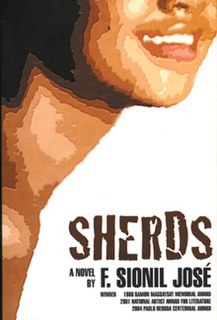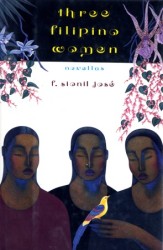 W
WBen Singkol is a 2001 novel written by Filipino National Artist F. Sionil José. It is about Benjamin "Ben" Singkol, who is described as “perhaps the most interesting character” created by the author. Based on José's novel, Singkol is a renowned novelist who wrote the book entitled "Pain", an autobiography written during the Japanese occupation of the Philippines. Through the fictional novel Singkol recalled the hardships experienced by the Filipinos during the occupation. Singkol was described to be a coward, a "supot" or an uncircumcised man who did not only run away from such a “ritual of manhood” but also evaded his “foxhole in Bataan when the Japanese soldiers were closing in”. Singkol was a “runner” or “evader” throughout much of his lifetime, while being haunted by the “poverty of his boyhood” and of the “treachery that he may have committed” in the past. In 1982, Singkol began receiving letters from a Japanese named Haruko Kitamura.
 W
WErmita: A Filipino Novel is a novel by the known Filipino author F. Sionil Jose written in the English language. A chapter of this novel was previously published as a novella in the books titled Two Filipino Women and Three Filipino Women.
 W
WGagamba, subtitled The Spider Man, is a novel by award-winning and most widely translated Filipino author F. Sionil José. The novel is about a Filipino male cripple nicknamed “Gagamba”, a vendor of sweepstakes tickets in Ermita, Manila. After being buried in the wreckage, the seller survives an earthquake, together with two other fortunate characters, that occurred in the Philippines in the middle of July 1990. The novel simultaneously raised a “fundamental question” about the meaning of life and offers one “rational answer”.
 W
WMass, also known as Mass: A Novel, is a 1973 historical and political novel written by Filipino National Artist F. Sionil José. Together with The Pretenders, the Mass is the completion of José’s The Rosales Saga, which is also known as the Rosales Novels. The literary message of Mass was "a society intent only on calculating a man's price is one that ultimately devalues all men".
 W
WMy Brother, My Executioner is a novel by Filipino author Francisco Sionil José written in Philippine English. A part of the Rosales Saga - a series of five interconnected fiction novels - My Brother, My Executioner ranks third in terms of chronology, after Po-on and Tree and before The Pretenders and Mass. In the United States, My Brother, My Executioner was published as a second part of the book, Don Vicente, together with Tree, another novel which is also a part of José’s Rosales Saga. Tree is the second novel of the historical saga, before My Brother, My Executioner. This novel was first published in the Philippines in the early 1970s.
 W
WPo-on A Novel is a novel written by Francisco Sionil José, a Filipino English-language writer. This is the original title when it was first published in the Philippines in the English language. In the United States, it was published under the title Dusk: A Novel. For this novel's translation into Tagalog, the title Po-on Isang Nobela – a direct translation of Po-on A Novel - was adopted.
 W
WThe Pretenders is a 1962 historical novel written by Filipino National Artist F. Sionil José. It is the second to the last novel composing José's series known as The Rosales Saga.
 W
WSherds is a 2007 short novel or novelette written by Filipino National Artist for Literature and multi-awarded author F. Sionil José. According to Elmer A. Ordoñez, a writer from The Manila Times, in Sherds José achieved “lyrical effects”, specially in the novel’s final chapters, by putting into “good use” Joseph Conrad’s and Ford Madox Ford’s so-called progression d’effet. Sherds is the latest and last novel by José. According to The Atlantic National Correspondent James Fallows, the novel is dedicated to the author’s wife Teresita José. The novel, which can be read in one sitting, was described by Li-an de la Cruz-Busto, a reporter for Sun.Star Davao as “very light but candid and insightful”, a description that complements The Manila Times reporter Perry Gil S. Mallari’s calling José’s Sherds as an “easy read and a guaranteed page-turner”. A novel composed of twelve chapters with a "tight and palpable" narrative pacing, Sherds deals with topics related to "personal conscience, greed and the position of art" in social class struggle, thus serving as a cogitation on "what is wrong" with the Philippines as a nation. José wrote Sherds while he was in Japan.
 W
WSin: A Novel, also known as Sins, is a 1973 politico-historical novel written by Filipino National Artist F. Sionil José. This particular work of literature features the History of the Philippines, for the most part spanning the twentieth century, through the eyes of the “amoral” Don Carlos Corbello, a wealthy patriarch also known by the moniker “C.C.”.
 W
WThree Filipino Women: Novellas is a book authored by award-winning Filipino literary writer, F. Sionil José. The book is a compilation of three novellas, each narrating a segment in the life and experiences of three women in the Philippines, providing the reader a journey to the "mentality and geography of the Philippines" and to the use of English as a language that the characters are "trying to make their own", reflective of how a Filipino speak in Philippine English, characterized by being "heavy on the reflexive" and with its own form of "phrasing" and "edge of formality".
 W
WTree is a 1978 historical novel by Filipino National Artist F. Sionil José. A story of empathy and subjugation, it is the second in José’s series known as The Rosales Saga or the Rosales Novels. The tree in the novel is a representation of the expectations and dreams of Filipinos.
 W
WViajero, Spanish for "The Wanderer" or "The Traveller", is a 1993 English-language novel written by Filipino author F. Sionil José. The literary theme is about the constant search of the Filipino people for “social justice and moral order”. Viajero is one of the literary representatives embodying the fulfillment of the Filipinos' "emergent-nationalism".
 W
WVibora! is a 2007 novel written by Filipino National Artist F. Sionil José. The novel narrates the life of an accidental hero, Benjamin Singkol, during the Japanese occupation of the Philippines after escaping from Bataan during the Second World War. Singkol in turn narrates the life of Artemio "Vibora" Ricarte whose identity is being questioned: whether a patriot or a collaborator to the Japanese occupiers.